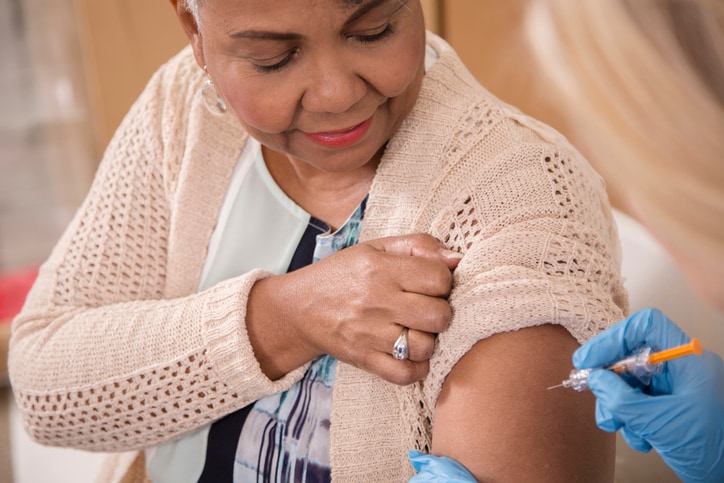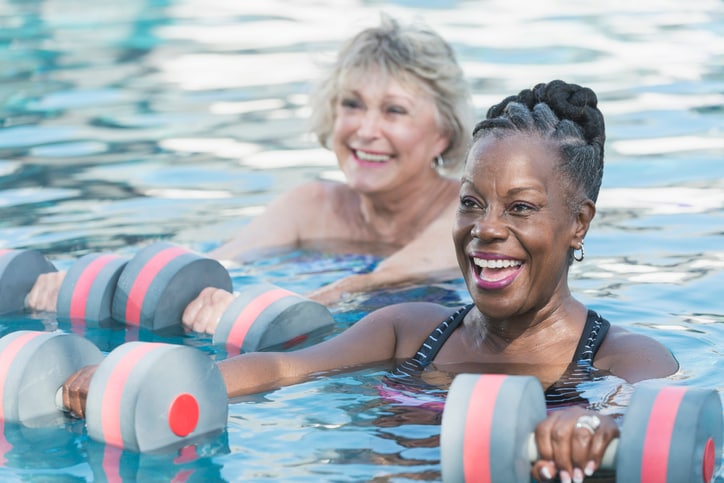Taking the proper precautions to stay healthy and protected throughout peak sickness season is important for everyone — but it’s especially crucial for seniors.
“For people over 65 years of age, especially those with chronic health conditions, even a seemingly mild cold can develop into a serious health condition, including pneumonia, an acute infection of the lungs that claims the lives of thousands of older Americans each year,” explains Scott Kaiser, MD, a geriatrician and director of Geriatric Cognitive Health for the Pacific Neuroscience Institute at Providence Saint John’s Health Center in Santa Monica, California.
“As we age, our immune system loses some of its effectiveness. Because of this, seniors are at a higher risk of getting serious complications from influenza and other circulating respiratory viruses such as the respiratory syncytial virus (RSV) and [COVID-19], explains Erica Susky, a certified infection control practitioner who holds a master’s degree in medical microbiology.
Thankfully, it is possible for seniors and caregivers to take precautions to stay healthy even when viruses are at peak circulation. Here are a few key tips for seniors to stay healthy, safe and protected this cold and flu season.
“Older adults may lose protection from a flu vaccine more quickly. At the same time, it takes about two weeks for your flu shot to start working. Mid- to late October may be the optimal time to get your shot.”
—Scott Kaiser, geriatrician
How to keep older adults healthy during cold and flu season
1. Prioritize vaccination
Seniors and those who spend time with them should schedule a flu shot and stay up to date on their COVID-19 boosters. “Getting regular vaccine boosters for influenza and COVID-19 will assist in preventing one from getting a serious infection or spreading it to more vulnerable loved ones,” explains Susky.
Yes, getting COVID-19 or the flu is still possible, even if you are vaccinated. However, Susky says getting vaccinated will still help prevent a severe infection — which is important for seniors with compromised immune systems.
“Because older adults may lose protection from a flu vaccine more quickly. At the same time, it takes about two weeks for your flu shot to start working, [so] mid- to late October may be the optimal time to get your flu shot,” says Kaiser. He emphasizes that getting the flu shot is important regardless of timing.
2. Wash your hands
You’ve heard it time and again, but it’s true: Washing your hands thoroughly and regularly can stop the spread of cold, flu and COVID-19 viruses. Susky points out that it’s particularly important to wash your hands before touching your face, which will prevent the accidental introduction of some viruses as they can survive on surfaces for many hours.
“Conversely, people should also wash their hands after eating or blowing their nose,” says Susky says, stopping the potential spread if they have a viral infection.
Kaiser recommends washing your hands with soap and water for at least 20 seconds or, if you find yourself without access to soap and water, using hand sanitizer with a minimum of 60% alcohol.
3. Avoid crowded indoor spaces
As much as possible, seniors should do their best to avoid places that will be overcrowded during cold and flu season. “Indoor spaces have less air exchanges to remove virus particles from the air,” explains Susky. Crowded spaces increase the risk of coming in contact with a potentially infectious individual.
If older adults can’t help but be in a crowded indoor space, it’s wise to mask up, according to Susky, as this will prevent transmission. She recommends medical-grade masks for seniors.
4. Keep a healthy routine
Both Susky and Kaiser stress the importance of habits like maintaining a healthy diet, staying well-hydrated (that means consuming about 15.5 cups of fluids a day for men and about 11.5 cups of fluids a day for women), exercising regularly and getting adequate sleep to help keep immune systems strong and functioning. Though it may seem like old-fashioned advice, Kaiser says it can prove invaluable to keep the immune system strong and functioning well during cold and flu season.
How caregivers can stay healthy through cold and flu season
When it’s your job to care for others, it’s important to prioritize your own health as well. Staying up to date on vaccines, proper handwashing and adopting a healthy diet, exercise and sleep schedule are all important for caregivers as well. Here are a few caregiver tips for self-care during cold and flu season.
1. Familiarize yourself with the signs of burnout
Caregiving can become more demanding during the winter months — especially if you suddenly have a house full of kids home for winter break or are under holiday stress of your own. Constant stress can compromise the immune system, which is why it’s especially important to identify and manage it. Signs of senior caregiver burnout can include:
- Lack of interest at work.
- Difficulty sleeping.
- Frequently getting sick.
- Irritability and mood swings.
- Overeating or not eating enough.
- Depression and anxiety symptoms.
2. Ask for help
Depending on your situation, support may be hard to come by. However, if you know you’re in need of a break from your caregiving duties in order to take care of yourself, communicate those needs to those around you and accept help. Respite care can be a helpful option for family caregivers who need a few extra hours back in their day to care for themselves.
3. Take small breaks
The hardest part about prioritizing self-care as a caregiver can be finding the time to do so — and feeling guilty when you do. Small breaks throughout the day afford caregivers the mental space to recharge without having to find hours of time to do so. Set timer reminders on your phone to take five minutes to sit outside, breathe and take in the scenery. Consider trying brief meditations from apps like Headspace or Calm to reset and recharge.
4. Make a contingency plan
Despite these best efforts, you may fall ill — in which case it’s important to know who will step in and provide care. Making these arrangements early in the season will make the transition less stressful and allow you to rest and recover.

